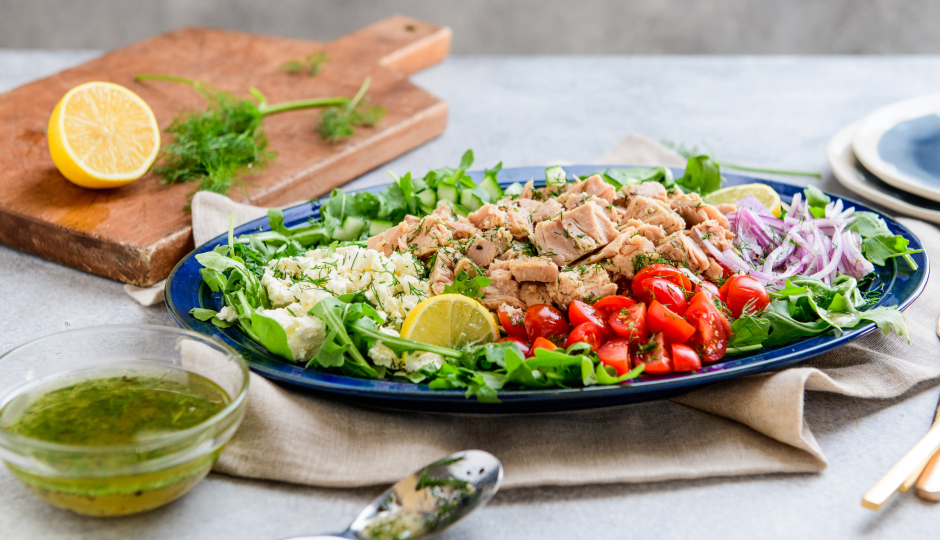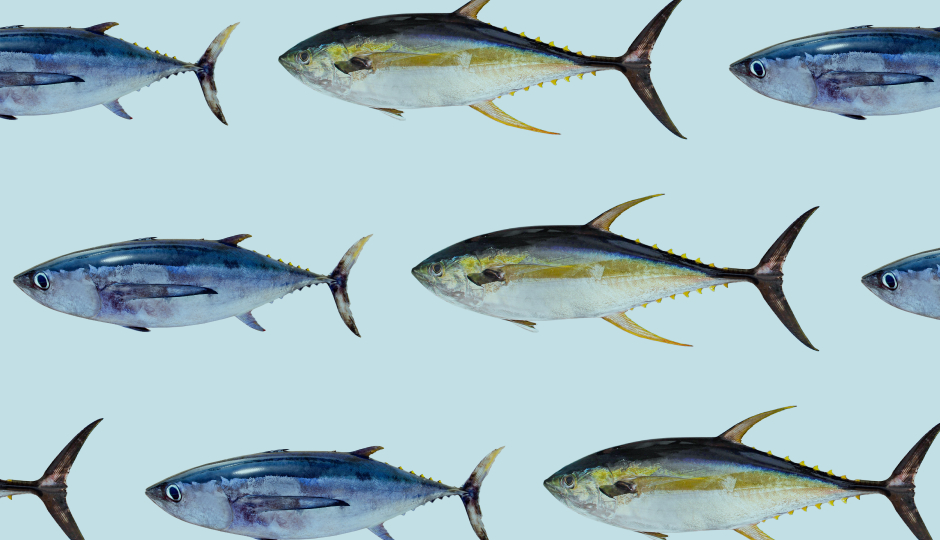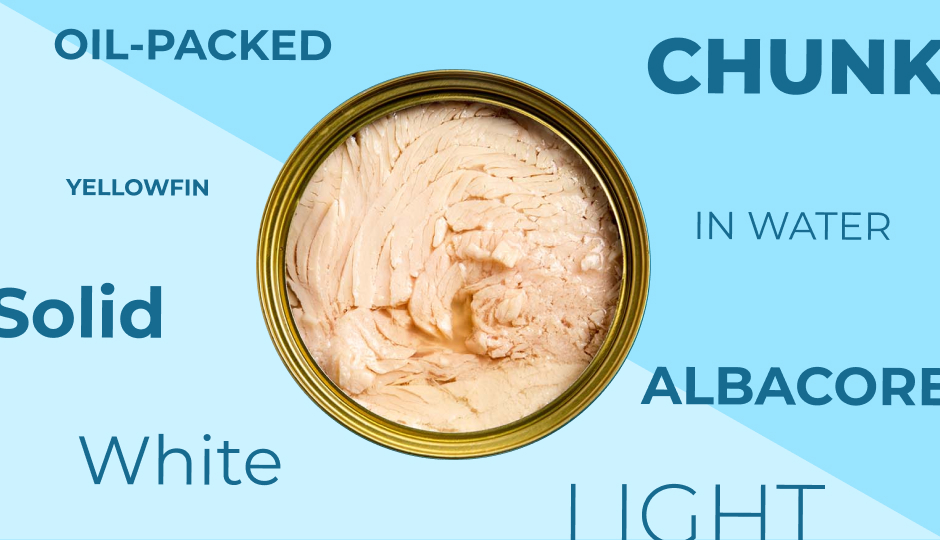Canned Albacore

In this guide, we describe what makes canned albacore tuna special and how you can make it a star in your everyday cooking.
What Sets Canned Albacore Apart?
Canned albacore tuna is like a kitchen superhero – easy to use and ready to rescue your meals in no time. And it’s not just tasty; it’s a nutritional powerhouse too. Whether you’re whipping up salads, sandwiches, or hearty casseroles, canned albacore is your secret ingredient for quick and delicious meals.
Canned Albacore vs. Yellowfin vs. Canned Skipjack
| Tuna Type | Often labeled as… | Flavor | Texture |
|---|---|---|---|
| Albacore | “Solid White” | Light, mild flavor (less fishy) | Meaty |
| Yellowfin | “Light” | Bolder flavor | Softer |
| Skipjack | “Light” | Stronger, fishier flavor | Softer |
Nutritional Value of Canned Albacore
Albacore tuna (Thunnus Alalunga) is a powerhouse of nutrition. It’s packed with protein, which is great for fueling muscles and keeping you full. In fact, a can of albacore tuna in olive oil contains a whopping 29 grams of protein. But that’s not all. It also features EPA and DHA Omega-3 fatty acids, which are good for your heart, brain, and eyes. Plus, it’s got a bunch of essential vitamins and minerals. This includes Vitamin D and B-12, and minerals like iron, potassium, and selenium. And the best part? It manages to pack in all this goodness with just 2 grams of saturated fat and 220 calories in a can. So, tuna is a great choice if you’re looking for a healthy and nutritious meal.
Considerations When Buying
When choosing canned albacore tuna, here’s a checklist of things to consider:
- Consider the brand’s sustainability practices. For example, the “Sea Change” logo indicates that the tuna comes from a fishery that has been independently assessed for sustainable practices.
- Look for responsibly caught, wild tuna.
- Check the freshness/sell by date.
- If buying online, look for high customer reviews.
- Avoid any cans that are dented or swollen, as these may indicate potential food safety concerns.
Comparing Canned vs Fresh Albacore
Canned albacore is cooked and preserved in a can, which helps it retain its natural juices and gives it a firm texture and mild flavor. It’s also more affordable than fresh albacore. Fresh albacore, on the other hand, has a more delicate texture and a richer flavor. However, it’s more expensive and may be harder to find.
Both forms are gluten-free and are rich in protein, feature Omega-3 fatty acids, and essential vitamins and minerals, so they each offer great nutritional value. Canned albacore actually generally contains more calcium than fresh albacore.
According to the NOAA, albacore tuna live in tropical and warm temperate waters in the Atlantic, Pacific, and Indian Oceans. In the Atlantic, they’re found from Nova Scotia to northern Argentina, and from Ireland to South Africa.
One of the best things about canned vs fresh is that unopened cans generally have a long shelf life, often ranging from 2 to 5 years. Canned tuna should be stored in a cool, dry place away from direct sunlight to maintain its quality.
Canning Process
The canning process for tuna is designed to ensure that the seafood is safe to eat, nutritious, and tasty. Once the best tuna has been picked, based on factors such as flavor, texture, and suitability for canning, it is then cleaned and cut into filets. This involves removing the skin, bones, and any unwanted parts to ready the fish for canning.
Here’s a simplified version of the process:
Pre-Cooking
The raw tuna fish is pre-cooked before being placed in the cans. This serves multiple purposes: improving the texture of the tuna, ensuring it reaches safe temperatures during the process, and enhancing the overall flavor of the final product.
Filling the Cans
The pre-cooked tuna is packed into cans, along with any additional ingredients based on the type of tuna being produced. These can include water-packed, olive oil, or various seasonings, depending on the product specifications.
Sealing
The cans are then sealed with a vacuum seal to prevent any contaminants from entering and to maintain the freshness of the tuna. This step is crucial in ensuring the safety and longevity of the canned product.
Heat Processing
The sealed cans are subjected to heat processing, effectively cooking the tuna within the can. This heat treatment not only ensures the destruction of harmful bacteria but also contributes to the preservation of the tuna.
Rigorous quality control measures are implemented throughout the entire process to ensure the canned tuna meets safety standards, retains its nutritional value, and aligns with product specifications.
Canned Albacore Recipes
Canned albacore tuna is versatile and can be used in a variety of dishes. Here are some easy and quick recipes:
Tuna Salad
Mix canned albacore with mayonnaise, chopped celery, and diced onions. You can also add in some chopped pickles or relish for a bit of extra flavor. Serve on a bed of lettuce or in a sandwich for a quick and satisfying meal.
Tuna Pasta Bake
This hearty dish combines al dente pasta, canned albacore, a creamy sauce, and a golden cheesy crust. It’s a crowd-pleaser that will leave everyone asking for seconds.
Tuna Stuffed Bell Peppers
The combination of tender bell peppers, zesty spices, and protein-packed tuna creates a satisfying dish that is as visually appealing as it is delicious.
Tuna and White Bean Salad
This protein-rich salad is perfect for a light and nutritious lunch. The blend of canned albacore, creamy white beans, crisp vegetables, and tangy vinaigrette creates a refreshing medley of flavors and textures.
Tuna Melt Sandwich
With a crispy exterior and a melty, cheesy interior, this sandwich takes the traditional tuna salad to a whole new level. It’s a quick and easy option for a satisfying meal.
Frequently Asked Questions
Is canned albacore healthy?
Yes, canned albacore can fit into a healthy diet as it features protein, omega-3 fatty acids and essential vitamins and minerals.
Is canned albacore tuna ready to eat?
Yes, canned albacore tuna is ready to eat straight from the can, as it is already cooked during the canning process.
What is the difference between canned tuna and canned albacore?
Canned tuna is a general term for a variety of tuna species, often Skipjack or Yellowfin, while canned Albacore is a specific type of tuna known for its lighter color, milder flavor, and firmer texture.


